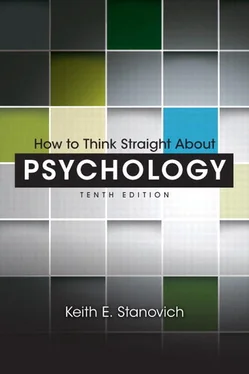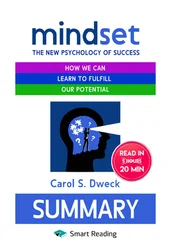Asimov’s example of the shape of the earth illustrates for us the context in which scientists use such terms as “mistake,” “error,” or “falsified.” Such terms do not mean that the theory being tested is wrong in every respect, only that it is incomplete. So when scientists emphasize that knowledge is tentative and may be altered by future findings, they are referring to a situation such as this example. When scientists believed that the earth was a sphere, they realized that, in detail, this theory might someday need to be altered. However, the alteration from spherical to oblate spheroidal preserves the “roughly correct” notion that the earth is a sphere. We do not expect to wake up one day and find that it is a cube.
Clinical psychologist Scott Lilienfeld (2005) contextualizes Asimov’s point for the psychology student:
When explaining to students that scientific knowledge is inherently tentative and open to revision, some students may mistakenly conclude that genuine knowledge is impossible. This view, which is popular in certain postmodernist circles, neglects to distinguish knowledge claims that are more certain from those that are less certain. Although absolute certainty is probably unattainable in science, some scientific claims, such as Darwin’s theory of natural selection, have been extremely well corroborated, whereas others, such as the theory underpinning astrological horoscopes, have been convincingly refuted. Still others, such as cognitive dissonance theory, are scientifically controversial. Hence, there is a continuum of confidence in scientific claims; some have acquired virtual factual status whereas others have been resoundingly falsified. The fact that methodological skepticism does not yield completely certain answers to scientific questions—and that such answers could in principle be overturned by new evidence—does not imply that knowledge is impossible, only that this knowledge is provisional. (p. 49)
The mistaken notion the science must yield certain knowledge is often used to undermine science itself. Paleontologist Neil Shubin has described how creationists use this tactic. In an interview with science writer Natalie Angier (2007), Shubin notes how “creationists first try to paint science as a body of facts and certainties, and then they attack this or that ‘certainty’ for not being so certain after all. They cry ‘Aha! You can’t make up your mind. You can’t be trusted. Why should we believe you about anything?’ Yet they are the ones who constructed the straw man of scientific infallibility in the first place” (p. 20).
What scientists most often mean by a solvable problem is a testable theory. The definition of a testable theory is a very specific one in science: It means that the theory is potentially falsifiable. If a theory is not falsifiable, then it has no implications for actual events in the natural world and, hence, is useless. Psychology has been plagued by unfalsifiable theories, and that is one reason why progress in the discipline has been slow.
Good theories are those that make specific predictions, and such theories are highly falsifiable. The confirmation of a specific prediction provides more support for the theory from which it was derived than the confirmation of a prediction that was not precise. In short, one implication of the falsifiability criterion is that all confirmations of theories are not equal. Theories that receive confirmation from highly falsifiable, highly specific predictions are to be preferred. Even when predictions are not confirmed (i.e., when they are falsified), this falsification is useful to theory development. A falsified prediction indicates that a theory must either be discarded or altered so that it can account for the discrepant data pattern. Thus, it is by theory adjustment caused by falsified predictions that sciences such as psychology get closer to the truth.
CHAPTER 3 Operationism and Essentialism: “But, Doctor, What Does It Really Mean?”
Do physicists really know what gravity is? I mean really. What is the real meaning of the term gravity ? What is the underlying essence of it? What does it ultimately mean even to speak of gravity? When you get down to rock bottom, what is it all about?
Questions such as these reflect a view of science that philosopher Karl Popper called essentialism . This is the idea that the only good scientific theories are those that give ultimate explanations of phenomena in terms of their underlying essences or their essential properties. In this chapter, we will discuss why science does not answer essentialist questions such as this and why, instead, science advances by developing operational definitions of concepts.
Why Scientists Are Not Essentialists
Scientists, in fact, do not claim to acquire the type of knowledge that the essentialist seeks. The proper answer to the preceding questions is that physicists do not know what gravity is in this sense. Science does not attempt to answer “ultimate” questions about the universe. Biologist Peter Medawar (1984) wrote,
There exist questions that science cannot answer and that no conceivable advance of science would empower it to answer. These are the questions that children ask—the “ultimate questions.” . . . I have in mind such questions as: How did everything begin? What are we all here for? What is the point of living? (p. 66)
However, the failure of science to answer questions about first and last things does not in any way entail the acceptance of answers of other kinds; nor can it be taken for granted that because these questions can be put they can be answered. So far as our understanding goes, they cannot. (p. 60)
Finally, however, there is no limit upon the ability of science to answer the kind of questions that science can answer. . . . Nothing can impede or halt the advancement of scientific learning except a moral ailment such as the failure of nerve. (p. 86)
One reason that scientists are suspicious of claims that some person, theory, or belief system provides absolute knowledge about ultimate questions is that scientists consider questions about “ultimates” to be unanswerable. Scientists do not claim to produce perfect knowledge; the unique strength of science is not that it is an error-free process, but that it provides a way of eliminating the errors that are part of our knowledge base. Furthermore, claims of perfect or absolute knowledge tend to choke off inquiry. Because a free and open pursuit of knowledge is a prerequisite for scientific activity, scientists are always skeptical of claims that the ultimate answer has been found.
Essentialists Like to Argue About the Meaning of Words
A common indication of the essentialist attitude is an obsessive concern about defining the meaning of terms and concepts before the search for knowledge about them begins. “But we must first define our terms” is a frequent essentialist slogan. “What does that theoretical concept really mean? ” The idea seems to be that, before a word can be used as a concept in a theory, we must have a complete and unambiguous understanding of all the underlying language problems involved in its usage. In fact, this is exactly the opposite of the way scientists work. Before they begin to investigate the physical world, physicists do not engage in debates about how to use the word energy or whether the word particle really captures the essence of what we mean when we talk about the fundamental constituents of matter.
The meaning of a concept in science is determined after extensive investigation of the phenomena the term relates to, not before such an investigation. The refinement of conceptual terms comes from the interplay of data and theory that is inherent in the scientific process, not from debates on language usage. Essentialism leads us into endless argument about words, and many scientists believe that such language games distract us from matters of substance. For example, concerning the question “What is the true meaning of the word life? ” two biologists give the startling answer that “There is no true meaning. There is a usage that serves the purposes of working biologists well enough, and it is not the subject of altercation or dispute” (Medawar & Medawar, 1983, pp. 66–67). In short, the explanation of phenomena, not the analysis of language, is the goal of the scientist. The key to progress in all the sciences has been to abandon essentialism and to adopt operationism, our topic of inquiry in this chapter.
Читать дальше












